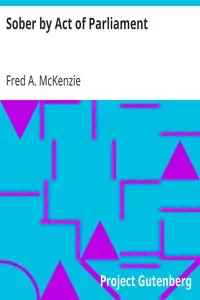"Sober by Act of Parliament" by Fred A. McKenzie is a historical account written in the late 19th century. The book examines the effectiveness of legislation aimed at promoting sobriety and controlling the liquor trade, drawing on examples from various regions, including America and Britain. It delves into the complexities surrounding alcohol laws and the societal factors influencing their success or failure. The author approaches the subject with a commitment to honesty and impartiality, seeking to present factual outcomes rather than advocating for a specific policy. The opening of the book introduces the reader to the motivations behind sobriety legislation, highlighting the conflict between advocates of prohibition and those in favor of regulated alcohol trade. McKenzie discusses recent attempts in South Carolina to regulate liquor through state-controlled dispensaries, detailing the challenges faced by proponents amidst fierce political opposition. He also touches on the wider implications of such laws on society, hinting at the nuances of governance and public sentiment that complicate the enforcement of sobriety measures. This sets the stage for a thorough exploration of how different regions grapple with the issue of alcohol regulation throughout the book. (This is an automatically generated summary.)

Sober by Act of Parliament
By Fred A. (Fred Arthur) McKenzie
"Sober by Act of Parliament" by Fred A. McKenzie is a historical account written in the late 19th century. The book examines the effectiveness of legi...
Genres
Released
2010-12-04
Formats
epub
mobi (images)
epub (images)
epub3 (images)
mobi
Free Download
Overview
About the Author
Frederick Arthur MacKenzie (1869–1931) was a Canadian journalist that covered several geopolitical developments in East Asia in the early 20th century. He was one of the few Western journalists to cover the Russo-Japanese War from the Japanese side and the Korean resistance against Japan during the Japanese occupation of Korea.
Total Reviews
10.0k
Total reviews from Goodreads may change














